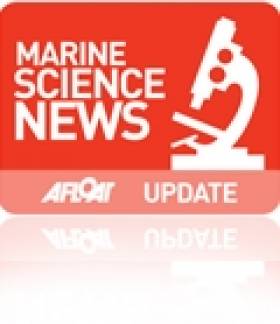Displaying items by tag: Seabad Mapping
INFOMAR Develops Transatlantic Co-operation In Seabed Mapping Programme
#MarineScience - George Hanna, a student of the Benthic Acoustic Mapping and Survey (BEAMS) programme in the USA, recently joined the Irish INFOMAR team on the research vessel RV Celtic Voyager during an inshore survey of Mizen Head, Co Cork.
The INFOMAR team provided fieldwork training on board the RV Celtic Voyager using the newly installed EM2040 state-of-the-art multibeam technology to develop detailed maps of the seafloor, as well as a sub-bottom profiler to identify and characterise layers of sediment and rock and surrounding habitat.
Training support is hugely beneficial in developing academic and career opportunities in bathymetric and seafloor habitat mapping on both sides of the Atlantic.
“With the rapid growth of new technologies used in ocean surveying, it is important that undergraduate students get fieldwork experience which focuses on strengthening their skills that can be used in the workforce,” said Thomas Furey, manager of Advanced Mapping Services at the Marine Institute and joint INFOMAR programme manager with the Geological Survey of Ireland.
Collaboration with the College of Charleston and University of Washington’s BEAMS programme came about after focussed development of international INFOMAR industry and research relations in recent years.
This was instigated following the transatlantic co-operation agreement, the 'Galway Statement', signed at the Marine Institute in 2013.
INFOMAR, which hosts its annual seminar in Waterford next week, also supported the nomination of Jay Calvert, University of Ulster, who was recently awarded a Fulbright-Marine Institute Scholarship to attend three months each at Alaska Pacific University in Anchorage, and Northeastern University in Boston.
The BEAMS programme is widely recognised internationally for the output of many academically qualified ocean surveyors, however gaining vessel experience can be challenging.
Volunteering as a survey technician through the programme, George Hanna highlighted the benefits of working with INFOMAR onboard the RV Celtic Voyager, stating: “I was extremely lucky to come to Ireland to get hands on experience on the Voyager and to work with some of the best sonar technology equipment out there.
"Getting real experience during survey operations and deploying numerous ocean-survey related instruments certainly helps support me in expanding my academic opportunities and also getting future work in the area of seabed mapping”.






























































